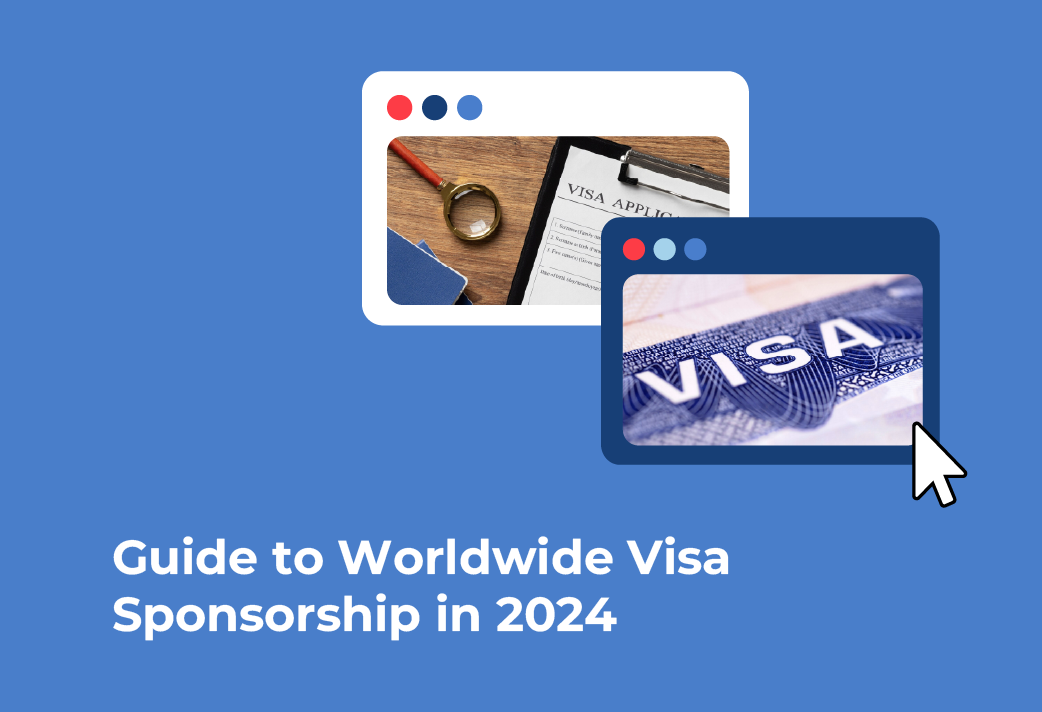In an increasingly globalized world, the desire to work abroad is a dream shared by go-getting employees and internationally-minded companies. Whether it’s the allure of new opportunities, cultural exploration, or professional growth, seeking international employment has become more attainable than ever before. However, navigating the complex landscape of visa sponsorship can often be an intimidating prospect.
4 Basic Types of Visa Sponsorship
Before getting or organizing visa sponsorship, it’s a good idea to understand the different types of visa sponsorship available for working abroad. Each type of visa has its own set of requirements, benefits, and limitations.
While the exact details of availability and requirements will vary greatly depending on location, the 4 most common types of visa sponsorship are:
Employment-Based Visas
These visas are job-specific and typically sponsored by an employer based in the destination country. They allow individuals to work in a specific job or occupation for a designated period.
Employment-based visas are often sought after by or for skilled professionals, as they offer the opportunity to pursue career opportunities abroad. However, they will also require more resources or support in the target country if used by an employer to transfer workers overseas.
Examples of employment-based visas include the H-1B visa in the United States and the Tier 2 (General) visa in the United Kingdom.
Investor Visas
Investor visas are aimed at individuals who are willing to invest capital in a foreign country. Often related to “golden visas,” they may also provide opportunities for long-term or permanent residency. A great option for those willing to make a large investment, these visas are often designed to attract foreign investment and stimulate economic growth.
Requirements for investor visas vary depending on the country, and they are often subject to changes based on public perceptions. However, they typically involve making financial or commercial investments in the local economy. Examples of investor visas include the EB-5 Immigrant Investor Program in the United States and the Golden Visa programs in countries like Portugal and Spain.
Family Sponsorship
A perfect option for those with pre-existing ties to a target country, family sponsorship visas allow individuals to join family members who are already residing in a foreign country. These visas are typically granted to spouses, children, parents, or other close relatives of citizens or permanent residents.
Family sponsorship provides a pathway for family reunification and allows individuals to live and work in the same country as their loved ones. As they are often used for the spouse or family of a worker sent abroad, requirements for family sponsorship visas depend on the relationship between the sponsor and the applicant as well as the immigration policies of the destination country. As a result, visa sponsorship for these visas may be offered as part of an expat package.
Examples of family sponsorship visas include the Spouse Visa in the United Kingdom and the Family Reunification Visa in Germany.
Student Visas
Student visas are designed for individuals who pursue education or training abroad. These visas allow students to enroll in academic programs at colleges, universities, or other educational institutions in a foreign country. In some cases, they may also be used by companies that provide training programs aimed at transferring successful students into full-time jobs.
Student visas often come with the option to work part-time while studying, allowing students to gain practical experience and support themselves financially. Therefore, student visa requirements typically include proof of enrollment in an accredited educational program, enough funds to cover tuition and living expenses, and at least some proficiency in the language of instruction.
Examples of student visas include the F-1 visa in the US and Tier 4 visa in the UK.
Whether you’re seeking global opportunities, investing in a new business venture, reuniting with family members, or furthering your education, there’s a visa option to suit your needs.
By familiarizing yourself with the requirements and benefits of each type of visa, you can make informed decisions and take the necessary steps to achieve your international aspirations.
What are the General Requirements for Visa Sponsorship?
- Employment or Training Offer – Most sponsored visas require something that will keep an applicant engaged in the target country, whether that’s a job offer from a qualified employer in the host country or a proven educational opportunity.
- Skills and Qualifications – As these visa sponsorships are usually aimed at attracting top talent from around the world, applicants are often required to demonstrate relevant skills, qualifications, and experience in their field.
- Background Checks – To help avoid issues down the line, clean criminal records, and provable good health are often conditions for visa approval.
- Financial Stability – Often, visas may require proof of the ability to support oneself or benefit from strong financial backing during the visa sponsorship period.
- Language Proficiency – Depending on the country and the reason for a visa sponsorship, applicants may need to demonstrate proficiency in the local language.
In general, the requirements for visa sponsorship will encourage visa holders to be active members of the community they enter, able to add their skills without relying on state support.
Region-Specific Guidelines
In addition to basic requirements, visa sponsorship regulations and limits will vary significantly from one region to another. Whether a country offers a specific skilled visa sponsorship program or simply requires foreign workers to be employed by a local company before seeking a work visa, here’s an overview of the guidelines for some popular destinations by region:
North America
The United States and Canada are prime destinations for professionals seeking international opportunities. As such, visa sponsorship programs here often require high levels of skills or certification and can take a long time to process.
In the United States, the H-1B visa is still a popular choice for skilled workers, particularly in fields such as technology, finance, and healthcare. However, it usually requires holders to be recognized or highly capable in their field, making the process hard for many.
Similarly, Canada offers the Express Entry system. This is designed to allow skilled workers to apply for a visa with a clear road to permanent residency based on factors such as education, work experience, and language proficiency.
Europe
Europe boasts a diverse range of opportunities for international workers, with many mainland European visa sponsorship programs providing access to the entire Schengen Area.
In the UK, the Tier 2 (General) visa is commonly utilized by skilled workers sponsored by UK employers. The EU’s Blue Card scheme offers similar opportunities for highly qualified non-EU citizens, particularly those with sought-after skills in STEM fields. Meanwhile, national programs such as France’s Talent Passport program are for talented individuals with expertise or experience.
Asia
Asia’s varied economies offer promising chances for those seeking the world’s biggest markets with exciting work-life balance prospects.
Japan’s Highly Skilled Professional visa provides a clear pathway for those with specialized skills and expertise needed in the local labor market.
At the same time, South Korea’s Employment Permit System facilitates the hiring of foreign workers in many key industries, including manufacturing and construction.
For those looking to operate there, India’s Employment Visa is geared towards providing options for foreign nationals looking to work with a registered Indian company.
Oceania
Known for their high quality of life and robust economies, Australia and New Zealand are popular choices for skilled migrants or companies looking to break into distant markets.
Australia’s skilled migration program, based around the Subclass 186 Employer Nomination Scheme visa, offers opportunities for skilled workers nominated and hosted by an Australian employer.
Similarly, New Zealand’s Skilled Migrant Category allows individuals with skills and qualifications in demand to live and work in the country permanently through a preferential visa.
Middle East
The Middle East is a hub of economic activity, attracting professionals from around the world.
In particular, the United Arab Emirates (UAE) offers various visa sponsorship options for foreign workers, including the UAE Employment Visa.
Saudi Arabia’s Work Visa also allows foreign nationals to work for a Saudi employer, often in sectors like oil and gas, construction, and healthcare.
“I Want to Work Abroad, How Can I Get an International Visa Sponsorship?”
For individuals or companies eager to embark on a journey of international growth, obtaining visa sponsorship with a local company is the first crucial step. Here are some key strategies to consider:
- Research – Thoroughly research visa options and requirements for your desired destination, considering factors such as job market demand, immigration policies, and the availability of local partner companies if you don’t already have a company structure in the country.
- Networking – Build connections with professionals and organizations in your target country to explore potential opportunities and sponsorship prospects. Local business networks can suggest the most practical roads through visa sponsorship systems or even suggest less well-known programs.
- Seek Professional Assistance – Consider seeking help from immigration consultants or local legal experts specializing in international visa sponsorship to navigate the process effectively. Making the wrong mistake in a visa application can set the process back by weeks, so it may be worth having expert support to avoid issues.
Make the Decision to Expand Your Reach Internationally Today with INS Global Expansion Services
Expanding your reach internationally can open doors to new possibilities and enriching experiences. With the support of INS Global Expansion Services, navigating the complexities of international expansion, including visa sponsorship, becomes more manageable.
International visa sponsorship programs often come with complex legal and regulatory requirements. A global Employer of Record (EOR) like INS Global specializes in ensuring compliance with employment laws and regulations in various countries.
From helping you to quickly establish a presence in a new market to streamlining compliance and administrative processes, INS Global provides comprehensive solutions to support your global ambitions.
Speak to our experts today to learn about how to quickly, easily, and safely set your sights on 160+ new markets around the world.


SHARE